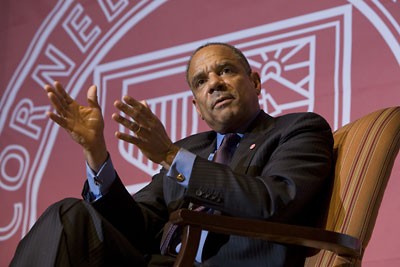Integrity critical for leadership, but executive salaries 'not an overriding issue,' says American Express CEO
By Anne Ju
Kenneth Chenault, chairman and CEO of American Express, didn't have a typical start in the business world. He studied law, not business, and he used to stereotype business people as "stuffy," he admitted to a Cornell audience April 3.
But despite his unusual background, Chenault rose through the ranks at American Express, first working in strategic planning and eventually reaching the top post in 2001. In a candid interview with USA Today reporter David Lieberman, Chenault shared thoughts on success, leadership and business strategies with a capacity audience in Statler Auditorium during the USA Today CEO Forum, hosted jointly by the Johnson School and the School of Hotel Administration.
"Integrity is critical," Chenault said on the topic of strong leadership. "If you're asking people to ... take some risk, they have to have a level of trust."
Those themes cropped up several times during the interview with Lieberman, whose report of the event will run in the Money section of USA Today.
Chenault described American Express' evolution from a company that issued charge cards and travelers' checks to relatively affluent consumers to one that offers a wide range of products for a more diverse consumer base. Lieberman pointed out that American Express cards can now be used at Burger King and Costco.
Chenault said he is constantly stressing innovation and challenging the status quo. As successful as American Express was in the 1980s and early 1990s, he said, the company lacked innovation during that time, becoming complacent in its role as a provider of charge cards and travel and entertainment services.
"They thought they were in a groove of success, and that became a rut," he said.
Lieberman also asked if Chenault felt that executive salaries, in some cases, have "gotten out of hand."
Chenault admitted that they had to an extent, but that it is not an "overriding issue."
"I think what is important, rather than just the level of pay, is what is the alignment and what are the drivers for that compensation?" he said. For example, American Express, he said, believes in motivated employees, so the company evaluates progress, in part, using an employee satisfaction survey. That survey, Chenault noted, carries about 25 percent of the weight in his own progress evaluation.
Lieberman also broached such hot-button topics as the economy and a possible recession, the weak U.S. dollar, consumer group criticism of the gift card industry and consumer credit card debt -- which some estimate to be approaching a record $1 trillion in the United States alone.
"Can consumers continue to pile on this debt? Is it reaching a breaking point?" Lieberman asked. Chenault replied that "by no means should anyone be complacent about the credit environment."
He said his company provides an array of products to balance its risk profile and that they've tried to target high-spending, highly rated customers.
The entire interview with Chenault is available on CornellCast: http://www.cornell.edu/video.
Media Contact
Get Cornell news delivered right to your inbox.
Subscribe